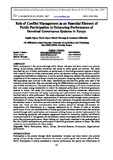| dc.contributor.author | Opiyo, Sophia | |
| dc.contributor.author | Guyo, Wario | |
| dc.contributor.author | Moronge, Makori | |
| dc.contributor.author | Otieno, Romanus Odhiambo | |
| dc.date.accessioned | 2018-11-23T15:16:29Z | |
| dc.date.accessioned | 2020-02-07T08:38:37Z | |
| dc.date.available | 2018-11-23T15:16:29Z | |
| dc.date.available | 2020-02-07T08:38:37Z | |
| dc.date.issued | 2017 | |
| dc.identifier.citation | Opiyo, S., Guyo, W., Moronge, M., & Odhiambo, R. (2017). Role of Conflict Management as an Essential Element of Public Participation in Enhancing Performance of Devolved Governance Systems in Kenya. | en_US |
| dc.identifier.uri | http://repository.must.ac.ke/handle/123456789/1288 | |
| dc.description.abstract | Public participation is the process through which citizens influence and share control over priority setting, policy-making, resource allocations and access to public goods and services. The study examined the role of public participation on performance of devolved governance systems in Kenya with a specific focus on citizen empowerment, policy and decision making, service delivery, conflict management and feedback mechanisms. A survey research design was adopted. The study population comprised of all the counties in Kenya. Cluster and purposive sampling techniques were used; and 400 respondents were involved in the study. Questionnaires and interview guides were used in the collection of relevant data. Data was analysed using the SPSS software and spreadsheets. A response rate of 84% was achieved. The study found out that effective handling of all forms of conflicts and their root causes among stakeholders is critical for enhanced performance of devolved governance systems in Kenya. The study also revealed that establishing effective stakeholder identification
processes ensures inclusivity and equity in planning and implementation thus avoiding unnecessary conflicts likely to stifle performance. The study emphasised on the importance of effective feedback mechanisms by counties to ensure implementation of decisions reached through citizen participation. Participation of citizens during the development of clear indicators of progress and performance and the attendant means of verification was also considered critical during project planning processes. The study also found out that communication from counties should be through sub-counties for
interpretation and dissemination in a language understood by all citizens in order to stimulate performance. It was also established that all county governance structures should ensure that decisions reached through public participation and consensus building forums are strictly implemented all the time. Instituting appropriate and adequate engagement forums for inclusivity, equality and effective citizen participation in management and development matters was emphasised for the development of policy that promotes performance. These findings will significantly contribute to the understanding of
the role of public participation on performance of devolved governance systems in Kenya. The study makes two recommendations for future studies. | en_US |
| dc.language.iso | en | en_US |
| dc.publisher | International Journal of Innovative Social Sciences & Humanities Research | en_US |
| dc.subject | Public Participation, Public, Citizen, Devolved Systems, Governance, Organizational performance | en_US |
| dc.title | Role of Conflict Management as an Essential Element of Public Participation in Enhancing Performance of Devolved Governance Systems in Kenya | en_US |
| dc.type | Article | en_US |

